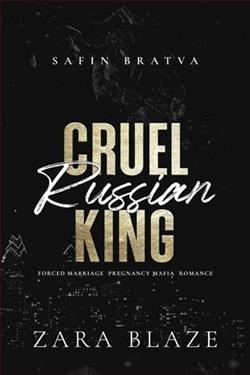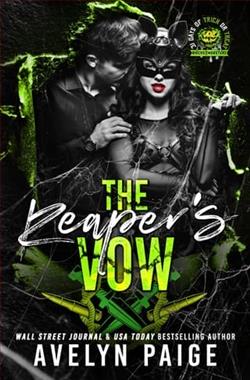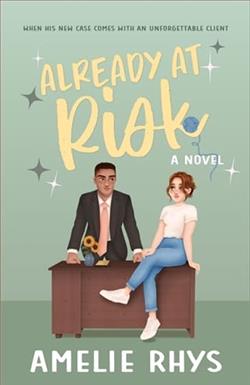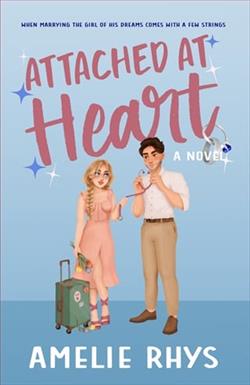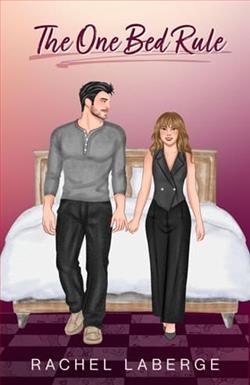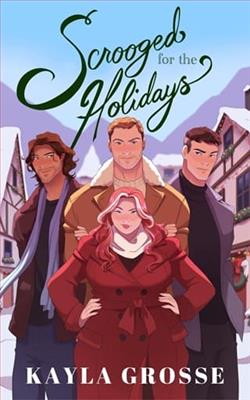Page 45 of A Slow Fire Burning
TWENTY-EIGHT
Theo stood at the sink in his kitchen, his left hand under the hot stream, watching the water run red to pink in the bowl. He had sliced a millimeter, perhaps two, from the very tip of his left forefinger and it was bleeding a surprising amount. The culprit, his recently sharpened Santoku knife, lay bloodied on the counter, next to it a pink-tinged garlic clove. The Santoku was hardly the right instrument for thinly slicing garlic, but his little chef’s knife was missing from the magnetic strip on the wall, lost, no doubt, somewhere in the chaos of the miscellaneous cutlery drawer, never to be found again.
Still, not to worry. There was good news. Good news, at last!
Despite the sudden and bitter cold, Theo had been out for a walk that morning and had, by coincidence, bumped into the young policeman, the one with the shaving rash, standing in the queue for coffee from the café on the towpath. Theo’s attempt to slip by unnoticed was unsuccessful; the young man collared him, his face the picture of apprehension.
“Mr. Myerson,” he said, sotto voce, “I was hoping I’d see you. There’s good news.”
“Oh?”
The young man nodded. “It’s not official yet, they haven’t put out a statement or anything, but I expect you’ll be hearing from them soon enough.” He took a deep breath, savoring his moment. “They’ve made an arrest.”
Theo gasped extravagantly. “Oh,” he said, his adrenaline spiking, “that is good news. Who, uh, can you tell me who they’ve arrested?”
“Laura Kilbride,” the police officer said. “The young woman you saw, the one... the one I mentioned before, the one I said”—he spoke from one side of his mouth—“had a history of violence?”
“And they’ve charged her?” Theo managed to ask.
“They will do. It’s only a matter of time. They found the knife,” he said.
“They... what? You mean the weapon?” Theo’s heart was pounding so hard in his chest, he thought he might pass out.
The young man grinned, ear to ear. “They’ve got her, Mr. Myerson, bang to rights.”
On the short walk home, Theo felt as though he’d scaled a mountain peak. His jellified legs could barely support him; he almost fell over twice trying to take evasive action from joggers. And yet at the same time he felt like dancing! It was over. They had her. It wasover. And the thing that made his heart soar was that it was not just this particular mess that was over, not just this awful, brutal business with Daniel, butthe whole thing. Daniel was gone and so wasAngela. Carla would suffer, she would grieve, she would feel whatever it was she needed to feel, but after that, she could start to get better, without anyone to drag her back down. The Sutherland mess, all that poison they had injected into his family, into his marriage, it could start to drain away now.
Theo knew they would never go back to what they had been—he wasn’t stupid—but he could see a way forward. He could see them building some sort of life for themselves, some sort of peace, and they could do it together now, with nothing and no one left to divide them.
With the blood finally stopped, Theo bandaged his finger, washed the knife, threw away the sullied garlic clove, and returned to his recipe. He left the chops marinating in oil, garlic, and mint, put on a coat, and took himself outside, onto the back porch to smoke a cigarette. He noticed, as he put the filter to his lips, that he still had blood in his nail beds. He thought, suddenly, of the morning he’d seen that girl outside—Laura, the one they arrested. After he saw her, he’d gone back to an empty bed and fallen asleep. When he woke, Carla was in the shower, and when she emerged, he called her over to him. He reached out his hand, tried to pull her back down onto the bed, but she resisted. He kissed her fingertips, the nail beds scrubbed pink.
Back inside, he was just pouring himself a glass of red when the doorbell rang. Carla must have forgotten her key. He picked up the pile of mail on the mat by the front door, slung it onto the hall console, opened the door with a smile on his face and butterflies in his stomach, like the old days.
“Oh,” he said, disappointed. “It’s you.”
TWENTY-NINE
Some things were the same, some things were different. Laura sat, bent over, her head resting on top of her folded arms. Last time was late at night, this time was early morning, although really, who could tell? There was no natural light in the room; it could have been any time. It was a different room, but for all intents and purposes it might just as well have been the same. Last time it had been overly warm, this time it was bloody freezing, but there were the same bright lights, the same cheap furniture. A nasty gray carpet like the one in her hallway at home. (Don’t think of home. Don’t think of home, or you’ll cry.) Like last time, Egg was there, and Eyebrow too, sitting opposite her, expressions grave. Graver than last time, she thought. Whenever she caught Egg’s eye, he looked away, and that made her scared.
She was exhausted. It seemed like days had passed, even weeks, since she’d received the phone call at Irene’s yesterday afternoon. She’d gone to meet the police at her home as per their request. She’d been cautioned, standing outside in the car park with all the neighbors watching, and they’d escorted her up the seven flights to herfloor. There were people already there, waiting on the walkway outside, dressed in those white protective suits like you see on TV.
“What’s going on?” Laura asked. “You’ve already done this, haven’t you? You searched here before—why do you have to do it again?” New evidence had come to light, someone said; they were going to have to search more thoroughly. There was a bit of waiting around, and then they brought her here, to the police station. It was late by that time. They put her in a cell and told her to get some rest. She hadn’t slept a wink.
“Laura?” Eyebrow placed a cup of water in front of her. “The duty solicitor’s just on his way now, all right? We’ll get started in a minute.”
“Yeah, all right,” Laura replied. “Cheers.”
That was the same—the polite, faux-friendly thing they did. They’d always done it; every run-in with the police she’d ever had, they did it. She’d imagined, though, that this time might be different, because this timewasdifferent. This wasn’t trespass, or disorderly conduct, it wasn’t public intoxication or petty theft. This was murder.
Murder!Laura felt a giggle rising up in her chest. She jerked upright, biting her lip, but fight though she might, she couldn’t keep it down; a chuckle rose out of her. Egg looked up from his notes, surprised. Laura laughed some more. It wasn’t funny, it wasn’t fucking funny. She laughed louder, longer, tears coming.
“Are you all right, Laura?” Egg asked her. She leaned forward, placing her forehead on the desk, chewing the inside of her cheek.Stop laughing stop laughing stop laughing stop fucking laughing.
The door opened and Laura stopped laughing. She looked up. A small, slender man with ginger hair and very pale skin held out a limp hand for her to shake. The duty solicitor, different from the one before. He gave her his name, which she immediately forgot, and aquick, nervous smile. Why washenervous? That wasn’t a very good sign, was it?
Egg said something; he was introducing them all, for the record. Laura listened to everyone’s names and then forgot them (again): Egg, Eyebrow, Nervous Guy. Laura Kilbride. They started asking questions, the same as last time. Where she had met Daniel, when, what time they’d gotten to the boat, what they’d done when they got there. All the same stuff they’d been over before, first in the flat and then at the police station.
“Fucking hell, change the record, won’t you?” Laura said at last. “We’ve done this already, haven’t we, we’ve sung this duet. Quartet?” She looked at Nervous Guy. “Would this be a quartet? You’re not really contributing all that much, though, are you? Do you do harmonies?”









